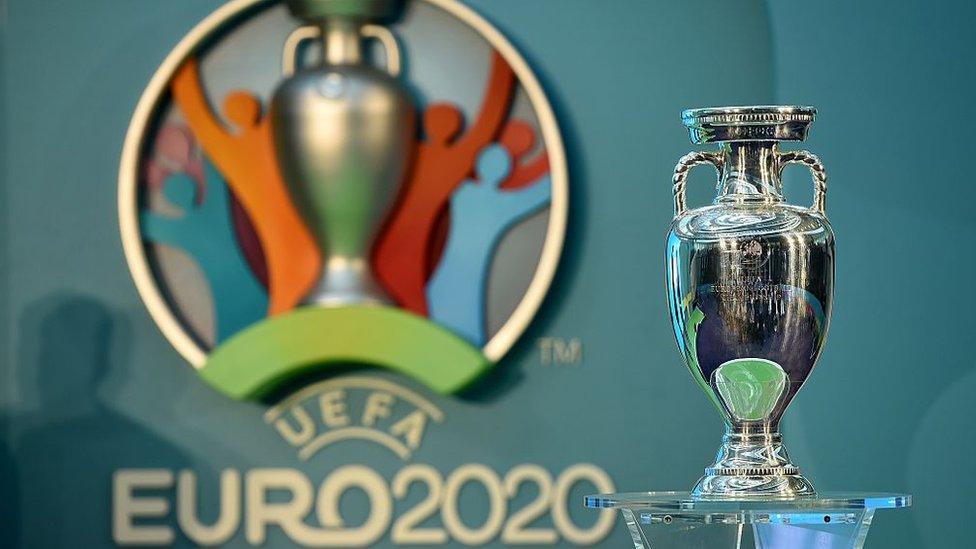Euro 2020: Everything you need to know about the Uefa tournament
- Published
- comments

Yes it's that time again, international football time!
It feels like just yesterday (last year in fact!) that we were celebrating England's men getting to the semi-finals of the Russian World Cup and we've barely caught our breath after the Women's World Cup.
Now it's time for the Euros 2020.
The qualifying stage for European Championship tournament has already kicked off, and the competition will carry on until July 2020 when the top two teams will battle it out in the final.
It's a very special version of European Championships as it marks it's 60th birthday.
Instead of there being a host nation, the matches will be staged in cities all over Europe.
Another change is that none of the teams will automatically qualify, which means no security for any countries hosting this year.
Want to now more? Settle in whilst we take you through all you need to know about Euro 2020!
See Ricky's report.
What are the Euros?
The European Championship (or Euros for short) is an international tournament played amongst member nations of Uefa, the European football body.
The idea for the competition came from Henri Delaunay who put forward the idea the of the European Cup to run alongside the World Cup. Unfortunately this never happened until after Delaunay's death in 1955.
His son Pierre joined French journalists in a campaign to kick off the European Nations Cup. They were successful and the first competition was held on 28 September 1958 in Moscow where home side, the USSR (now Russia), won.
The next competition was held in 1960, with the tournament then held every four years. The trophy was named after Henri Delaunay and is still awarded to this day.
The country with the most success in the Euros is Germany, having won three times and been runners up three times.
England and Wales have never made it further than the semi-finals, whilst Scotland and Northern Ireland have never made it further than the group stage.
Who plays in it?
This year 55 countries are battling in the qualifying matches to get down to the final 20.
These are the groups for the qualifying stage. The list of countries will be narrowed down to 20 following the results of the qualifiers:
Group A: England, Czech Republic, Bulgaria, Montenegro, Kosovo.
Group B: Portugal, Ukraine, Serbia, Lithuania, Luxembourg.
Group C: Netherlands, Germany, Northern Ireland, Estonia, Belarus.
Group D: Switzerland, Denmark, Republic of Ireland, Georgia, Gibraltar.
Group E: Croatia, Wales, Slovakia, Hungary, Azerbaijan.
Group F: Spain, Sweden, Norway, Romania, Faroe Islands, Malta.
Group G: Poland, Austria, Israel, Slovenia, Macedonia, Latvia.
Group H: France, Iceland, Turkey, Albania, Moldova, Andorra.
Group I: Belgium, Russia, Scotland, Cyprus, Kazakhstan, San Marino.
Group J: Italy, Bosnia-Herzegovina, Finland, Greece, Armenia, Liechtenstein.
When are the Euros?
Scotland played Belgium back in June
They've technically already begun!
The qualifying stage matches began back in March and will continue until November when those who have qualified will go through to the group stage.
This group stage is the start of the main tournament with the first match kicking off at the Stadio Olimpico in Rome on the 12 June 2020.
Where are the Euros?
In previous years the Euros would be hosted by one country or sometimes shared between two. But this year it's slightly different, with matches being hosted all over Europe in several host cities.
For 2020 these are: Amsterdam, Baku, Bilbao, Bucharest, Budapest, Copenhagen, Dublin, Glasgow, London, Munich, Rome and St Petersburg. Both semi-finals and the final will be held at Wembley Stadium in London, with the final on Sunday 12 July 2020.
How can I watch it?
If you want to go a match, you'll have to get a parent or guardian to apply for tickets.
The next ballot opens in December 2019 and all the details they'll need are on the Uefa website.
As for watching at home on TV, both the Â鶹ԼÅÄ and ITV will be sharing the coverage.
We'll update you with the times that the matches will be on TV nearer the time.
- Published26 March 2019
- Published25 July 2019
